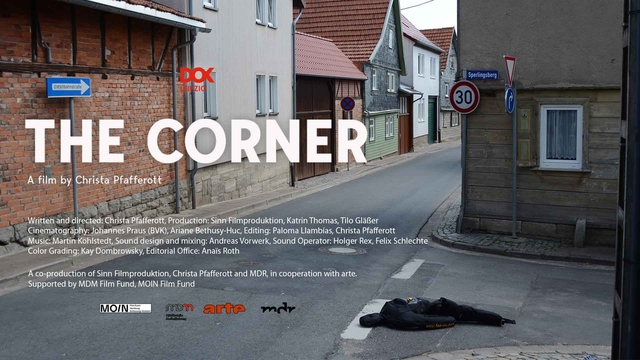The Producers

Christa Pfafferott - Director
With my stories I want to make unnoticed topics visible and touch people in a lasting way. To do this, it is important to me to go into psychological depths and to dive into different worlds of society.
Currently I am working on a literary novel – supported by a scholarship from the Kulturstiftung Thüringen.
My current film Die Ecke (The Corner), funded by MDM Filmförderung and Moin Filmförderung, in co-production with MDR and in collaboration with arte, follows the story of a 1945 photo from Thuringia. The film had its world premiere at the DOK Festival Leipzig 2022 and is broadcasted on arte and MDR after a theatrical tour.
My previous film Other World“, about female nurses and patients in a clinic for forensic psychiatry, was awarded the Marlies-Hesse-Prize and shown at festivals, on TV and is currently shown on Netflix. I also wrote my dissertation on the subject, "The Panoptic Gaze,“ which was published by transcript.
My films, such as Difficult Birth, about a mother who became pregnant unintentionally, or Party of the Aged, about a family caring for their grandmother, have been screened and awarded several times.
Making The Film
When I started The Corner, I didn't know why I was interested in an old photo from World War II. I didn't know why I was interested in war at all. There I asked people these questions: "What do you remember about the war? Could such a war happen again?" And then, after finishing the movie a new war broke out in Europe, Russia against Ukraine. As if in an uncanny way, my worries caught up with me. How are we still connected to the events of that time? I ask this question again and again in my movie. It is said: "When a generation of contemporary witnesses dies, then it tips over, then the social climate changes again.” The German historian Jan Assmann calls this stage a "gap". This gap is happening right now: The last witnesses of the Second World War are now dying. And the social climate is changing in Germany, in Europe and all over the world. That is what drove me to make this film.
The film is about a photo which shows an unknown American soldier from Texas. In the end of the film shooting I found a descendant of this dead soldier. Robert Culverhouse, a grand nephew, 34 years old, who owned all the legacy of the soldier from the photo – but did not know about the photo at all. He traveled from Texas to Germany to find out why he felt so connected to his great-uncle. He was convinced that it was important that we tell our stories and preserve them. To keep the memory alive and thus our present. That impressed me and this is also what the movie is about.
In the end when the movie was finished it got an invitation from the German embassy in the US and was shown and discussed at the Davidson College in North Carolina.
I travelled to Eastland in Texas and showed THE CORNER in the Majestic theatre of Eastland, the small village, where the dead soldier of the photo came from. The cinema was fully packed with descendants and cowboys who were emotionally blown away by the film. It seemed that the film made a full circle. And it showed me: Sometimes when you make art you don’t know why you feel attached to something. Like I was to this historical picture. But in the end it all works out. In an unexpected way. This is why I love to make documentaries. When the film itself also creates a new reality after it is finished.
–
Christa Pfafferott, Director
 In 1945, an unknown American soldier was shot on a street corner in Germany. A photo of his body became famous around the world. Today, a descendant of the soldier travels back to the corner. A German woman has lived in the same house by the corner since the war. A middle-aged Neo-Nazi sits in his living room a few doors down, surrounded by Hitler memorabilia. This doc weaves a fascinating tapestry of past and present.
In 1945, an unknown American soldier was shot on a street corner in Germany. A photo of his body became famous around the world. Today, a descendant of the soldier travels back to the corner. A German woman has lived in the same house by the corner since the war. A middle-aged Neo-Nazi sits in his living room a few doors down, surrounded by Hitler memorabilia. This doc weaves a fascinating tapestry of past and present.

 DOK Festival Leipzig | World Premiere
DOK Festival Leipzig | World Premiere





